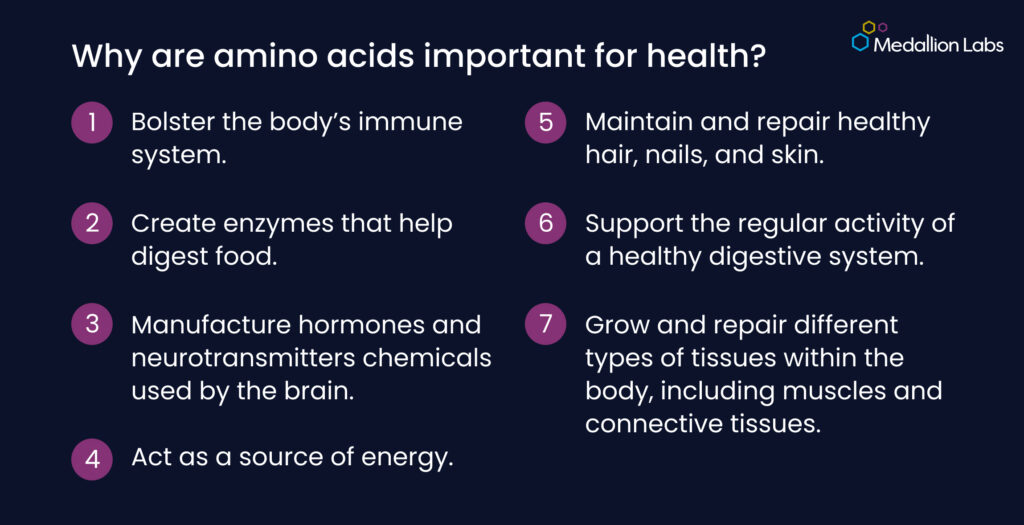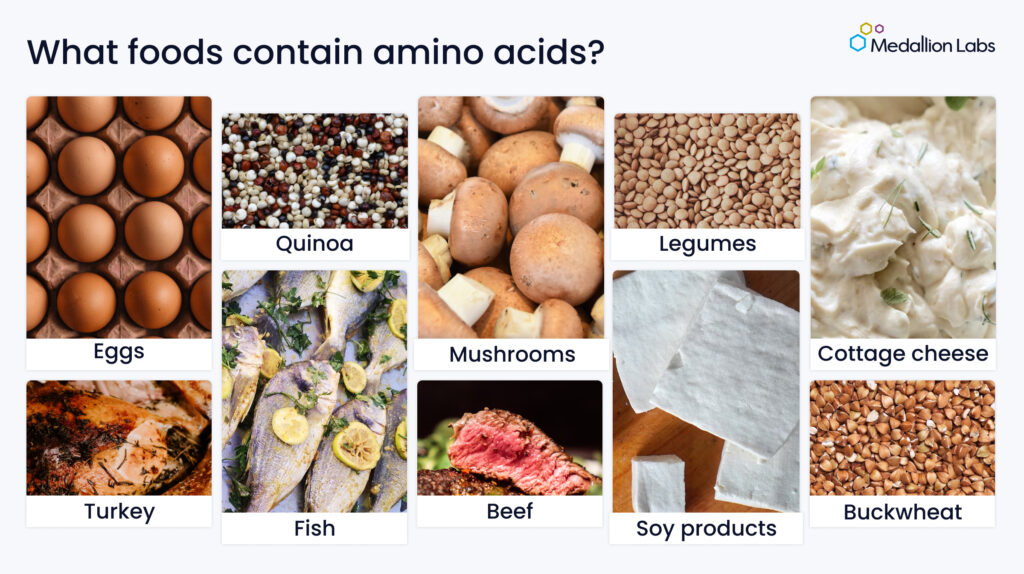Everything food producers & brands need to know about amino acids

Whether actively trying to build muscle or simply eating enough to feel full, consumers care about the protein content of their food. And, today's consumers are more informed than ever about protein, looking beyond just the gram count to understand its quality. This heightened awareness includes the amino acid profile of their food choices. Consequently, food brands and producers must possess a strong understanding of amino acids – their fundamental nature, the significance of 'essential' amino acids, and the best practices for transparently communicating their presence in product labeling and marketing.
What are Amino Acids?
Amino acids are the building blocks of proteins. The body combines them in various sequences to create different proteins, which are essential for a wide range of functions.
- Think of amino acids like letters of the alphabet – different combinations create different "words" (proteins).
- These proteins are used to build and repair tissues, create enzymes and hormones, and support the immune system.
Why are Amino Acids Important for Health?
Proteins, built from amino acids, are vital for more than just muscle growth. They play a crucial role in:
- Immune System Support: Proteins help create antibodies that fight off infections.
- Enzyme Production: Enzymes are essential for digestion and other bodily processes.
- Hormone and Neurotransmitter Synthesis: These chemicals regulate various functions, including mood, sleep, and appetite.
- Energy Source: Proteins can be broken down for energy when needed.
- Tissue Maintenance and Repair: Proteins are essential for healthy hair, nails, skin, muscles, and connective tissues.
- Digestive Health: Proteins support the proper functioning of the digestive system.

Essential Amino Acids: The Ones You Need to Know
The body cannot produce nine specific amino acids, making them "essential" and requiring them to be obtained through diet. These include:
- Histidine:
- Function: Production of histamine, a neurotransmitter involved in immune response, digestion, sleep, and sexual function.
- Research suggests Histidine also plays a role in cognitive function and protection against oxidative stress.
- Isoleucine:
- Function: Muscle metabolism, immune function, hemoglobin production, and energy regulation.
- Isoleucine is a branched-chain amino acid (BCAA) important for muscle recovery after exercise.
- Leucine:
- Function: Protein synthesis, growth hormone production, wound healing, muscle repair, and blood sugar regulation.
- Leucine is a key BCAA that triggers muscle protein synthesis, making it important for athletes and those looking to build muscle.
- Lysine:
- Function: Energy production, hormone synthesis, and immune function.
- Lysine is also important for collagen production, which supports skin, bone, and connective tissue health.
- Methionine:
- Function: Tissue growth, detoxification, and mineral absorption (selenium and zinc).
- Methionine is a sulfur-containing amino acid that plays a role in the body's antioxidant defense system.
- Phenylalanine:
- Function: Production of neurotransmitters (dopamine, norepinephrine, epinephrine) and other amino acids.
- Phenylalanine is a precursor to tyrosine, another important amino acid.
- Threonine:
- Function: Collagen and elastin production, blood clot formation, fat metabolism, and immune function.
- Threonine supports the immune system by helping to produce antibodies.
- Tryptophan:
- Function: Nitrogen balance, serotonin production (regulates sleep, mood, and appetite).
- Tryptophan is a precursor to melatonin, a hormone that regulates sleep-wake cycles.
- Valine:
- Function: Muscle growth, energy production, and tissue regeneration.
- Valine is another BCAA that works with isoleucine and leucine to promote muscle recovery and growth.
Food Sources of Amino Acids

Both plant and animal sources can provide essential amino acids.
- Complete Proteins: Foods containing all nine essential amino acids. Examples:
- Eggs
- Quinoa
- Buckwheat
- Meat (Beef, Poultry, Fish)
- Dairy (Cottage Cheese, Milk, Yogurt)
- Soy products (Tofu, Edamame)
- Incomplete Proteins: Foods lacking one or more essential amino acids. Examples:
- Legumes (Lentils, Beans)
- Nuts and Seeds
- Grains (Rice, Wheat)
- Combining Incomplete Proteins: Eating a variety of incomplete proteins throughout the day can provide all essential amino acids. Example: Beans and rice.
Recommended Daily Intake of Essential Amino Acids
The following values are estimates and can vary based on individual needs, activity level, and overall health. It's best to consult with a registered dietitian or healthcare professional for personalized recommendations.
- Tryptophan: ~1.8 mg per pound of body weight
- Isoleucine: ~9.1 mg per pound of body weight
- Phenylalanine: ~11.3 mg per pound of body weight (combined with Tyrosine)
- Threonine: ~6.8 mg per pound of body weight
- Valine: ~10.9 mg per pound of body weight
- Lysine: ~13.6 mg per pound of body weight
- Histidine: ~4.5 mg per pound of body weight
- Leucine: ~17.7 mg per pound of body weight
- Methionine: ~8.6 mg per pound of body weight (combined with Cysteine)
Amino Acids in Processed Foods: Maintaining Nutritional Integrity
Protein, being a reactive macronutrient, is susceptible to changes during food processing. Food producers must be aware of these potential alterations to ensure the nutritional value of their products. Key considerations include:
- Maillard Reaction: This reaction, responsible for browning and flavor development, can reduce the bioavailability of essential amino acids like lysine. While contributing to desirable sensory qualities, it's crucial to manage this reaction to minimize nutrient loss.
- Oxidation: Oxidation can also degrade amino acids, diminishing the overall protein quality.
- Vulnerability of Infant Formulas: The loss of essential amino acids, particularly lysine, in infant formulas can have significant detrimental effects on infant health and development.
- The Importance of Amino Acid Profiling: To ensure nutritional value and meet labeling requirements, food producers should conduct thorough amino acid profiling of their products. This analysis helps to understand the impact of processing on amino acid content and bioavailability.
Testing and Analysis with Medallion Labs
- Offer: Medallion Labs provides testing services to measure specific amino acids or unbound amino acids in food products.
- Benefits: Helps food producers ensure product quality and meet labeling requirements.
- Consultation: Experts can help you choose the appropriate testing solutions.
Conclusion
Understanding amino acids is crucial for food producers and brands to meet consumer demand for high-quality protein. By ensuring the presence and bioavailability of essential amino acids in their products, companies can provide nutritious and appealing options for health-conscious consumers.
Let's Get to Work!
Submit your order online and ship your samples today. If you have questions, we are always here to help.
Medallion Labs+
A food testing program designed with mid-market and enterprise food and ingredient manufacturers in mind.